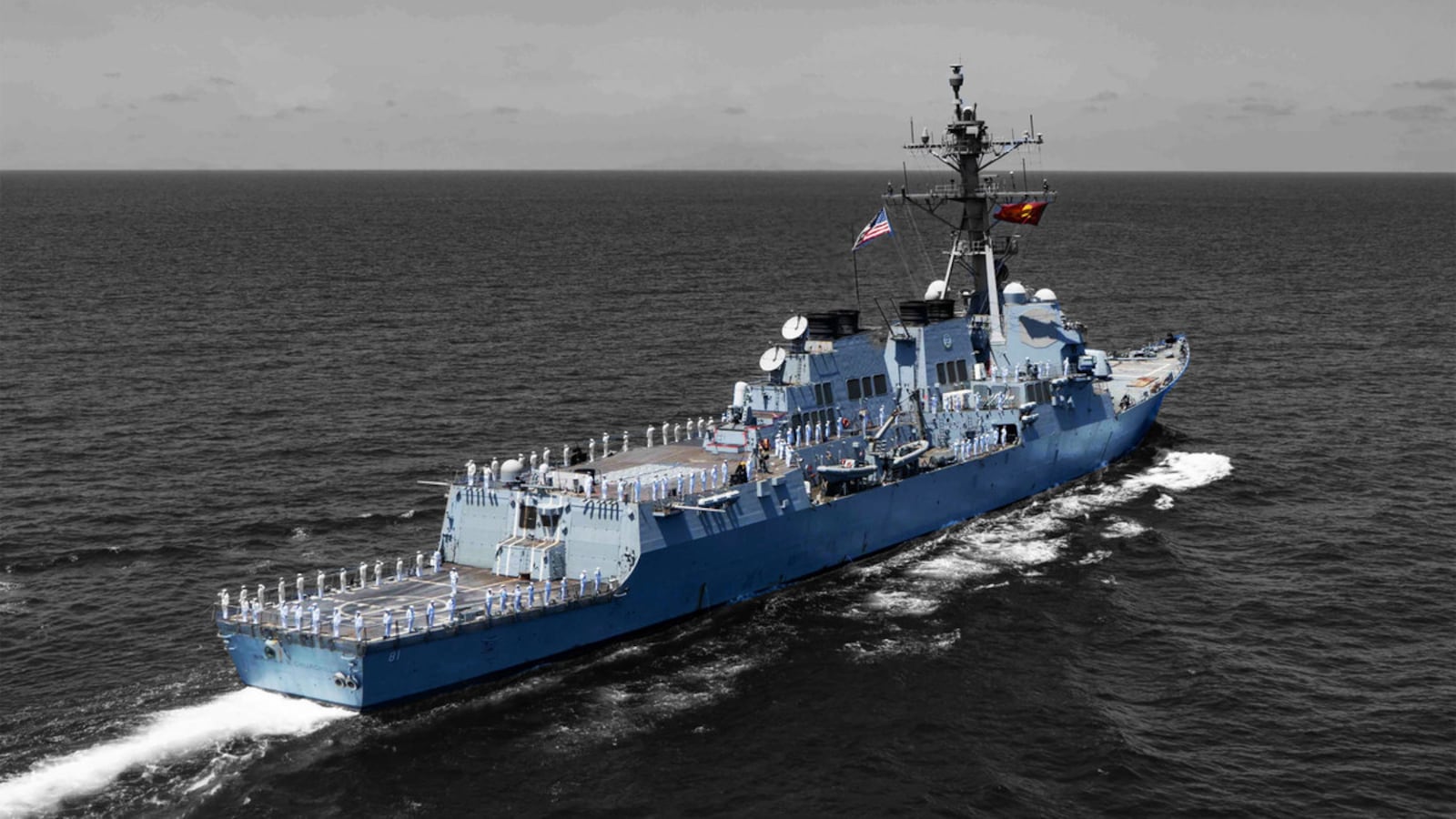Jonathon Morris was a civilian mariner—or “civmar”—one of the 5,500 maritime professionals hired by the U.S. Navy to work on ships transporting people and supplies around the globe.
The job didn’t suit his personality, said someone close to him. He was quiet and introverted, not the type who enjoyed months in cramped quarters. When he was on shore, he loved long-distance bicycling, spending weeks alone on the trails around his home in Southern California.
But on the USNS Amelia Earhart, he found a position that separated him from the crew. A third mate, he led the night watch, in charge of three other civmars. He spent hours on the bridge against an endless backdrop of waves and starlight as much of the Earhart’s crew of 130 slept.
By July of this year, the atmosphere on the Earhart was tense, according to three people who were on board. Due to COVID-19 restrictions, civmars could not leave the ship even when it was in a port. People were overdue for months for replacement, as quarantining procedure slowed the rotation of personnel.
Morris dealt with a dispute among two crew members under his leadership. One, a white man, reportedly leveled a racial insult at another, a Black woman. The situation caused a change in the Earhart’s firearm policy. Usually, the watch commander was issued a 9-millimeter pistol and the crew member guarding the gangway was issued a shotgun. They stopped issuing the shotgun.
Morris referred the issue to his superior, who did not do anything about it. The woman came to the first mate, who is one rank below the captain, for help. The top brass decided Morris was not cut out for leadership and planned to transfer him to the day watch. It would actually mean a pay increase, but he would be on the ship for another four months (at least) instead of another two. He confided to a co-worker that he was crumbling under the extended time at sea, the less desirable posting, and a sense of failure.
On July 22, according to a firsthand witness, Morris, still in charge of the night shift, approached the young woman who reported being harassed, said he was sorry for everything she endured on the ship, went on to the bridge, and, alone, used the pistol he had been issued to shoot himself in the head.
The effect on the crew, about 100 of whom are civmars, was devastating.
Civmars and their unions say civmars have reached a breaking point, as the Navy stands by its “gangway up” order, confining civmars, and only civmars, to ships. During the COVID-19 pandemic, MSC has exerted unprecedented control over civilians in ways that have damaged their mental health, eroded the atmosphere of their workplaces, and placed them in situations that increased their fear of contracting the virus, according to nine civmars on several vessels who spoke to The Daily Beast on the condition of anonymity for fear of career repercussions.
“Some people complained that they couldn’t go anywhere [during quarantine],” said one civmar. “I couldn’t even feel grass beneath my feet.”
Civmars usually sign on for a few months, but contractually, they have to wait for another civmar to relieve them before they can leave. Some of them are overdue for relief by as many as four months. At some points during the pandemic, more than 900 civmars were overdue, according to the International Organization of Masters, Mates & Pilots. The union and two others wrote a plea to MSC leaders, warning of “growing anger, frustration and despair throughout the fleet.”
The restrictions began months earlier, on March 21, when Rear Admiral Michael A. Wettlaufer, head of the MSC, issued a “gangway up” order restricting civmars to their ships. It cited a need for “swift implementation of actions that will protect the health of our afloat units” and preserve military readiness. The order remains in place, though captains have discretion to relax it.
At first, many civmars felt it was a fair precaution. The cruise ship Diamond Princess had shown how COVID-19 could quickly spread at sea.
However, many civilian mariners were shocked to find that the restriction applied only to them. Their ships were boarded continually by Navy personnel and DOD contractors, many of whom had roamed free in an America overrun with the coronavirus.
“We would watch them leave every night,” said one civmar. “It was like we were behind bars.” Some of them slept on the ship for months, though they were a few miles away from homes in port cities like San Diego and Norfolk.
Jillian K. Morris, deputy director of congressional and public affairs for MSC, wrote in an email response that the “risk of introduction of disease to our ships by non-crew personnel was reduced through screening prior to boarding, physical distancing and minimal interactions, wearing of masks and other protective equipment, established access routes aboard ship, and sanitization in work and access areas following any evolution involving off-ship personnel.” She did not address the movement of Navy crew, who civmars said moved on and off ships freely in most cases.
Some civmars said they were not provided masks or protective gear for several weeks. They wrapped cloths or T-shirts around their faces.
One civmar said that, while her ship was under repair, the Navy assigned the civmars to administer temperature checks to the contractors coming on board. “Every day we were a foot away from a hundred strangers,” she said. If the idea of restricting them to the ship was shielding the crew and its crew from coronavirus, this task seemed baffling.
Civmars also complained that MSC had neglected the entirely predictable problem of mariners running out of basic toiletries and medications. Many had to devise some way to get the supplies and plead with superiors about making some exception to the rules that would allow it to work, which they found humiliating.
A civmar in her fifties says she asked “a twentysomething Navy officer” to bring her tampons and deodorant when he returned to the ship. Another asked that her mother be allowed to bring a supply package and leave it at the base. The request was denied.
In a more severe case, a civmar ran out of hypertension medication on a ship in Italian waters. He had been on a ship for six months and was overdue for relief by one month when he reported to sick bay with dizziness. According to emails between his superiors and union officials, he was taken onshore to an Italian hospital and then volleyed to a Navy facility. He suffered cardiovascular trauma and organ damage and was deemed medically unfit to continue serving on the ship, and flown home.
Morris wrote that, “From the beginning, MSC ship masters have had the authority to accommodate requests for non-liberty exceptions such as medical visits and shipboard logistics including trips to obtain health and comfort items.” She said the Navy organized shipments of medications.
Tension is high, civmars report, even among themselves. Conflicts escalate as groups share spaces and get few breaks from each other.
One civmar said her crew was moving items when she told a fellow civmar to stop sitting and help. He lunged at her, she said, but a non-Navy supervisor physically interceded. She provided The Daily Beast with an incident report, signed by the supervisor. She said the captain refused to remove the aggressor from the ship and told her to simply avoid him. They were scheduled different shifts but still shared gym and dining areas.
The most alarming incident from the period of the “gangway up” order was the suicide of Morris on the Amelia Earhart.
Two co-workers found him with a self-inflicted head wound on the bridge. According to multiple eyewitnesses, the chief medical officer and a small crew with some medical training (none of whom were doctors) attempted a series of frenzied, fruitless efforts to revive him. One stuck an IV needle into his arm. Another attempted CPR. They only managed to spread the blood and gore over the bridge area before transporting him to the dock, where ambulatory medics from Bahrain, where the ship was stationed, declared him dead.
With no other place for his body, crew members put it in a food storage refrigerator until the Navy could arrange for it to be transported to his family.
“Everything just went downhill then,” said a civmar on board. Some civmars couldn’t sleep. Some struggled to eat after putting their friend’s body in a fridge where the food on their plate may have been stored. Some dreaded the bridge. The woman who was the alleged victim of racial harassment was helicoptered off the ship. At least two crew members were taken off steering duty. “We wanted them to bring on a psychologist but we knew they never would.”
Naval Criminal Investigative Service swarmed the ship, and the crew was in a state of shock. “We hoped they would bring a psychologist on board,” said one civmar, “but we knew they wouldn’t.”
Particularly affected was one of the women who found the body. According to sources, her speech was reduced to mumbles. She couldn’t sleep alone and began sleeping in a friend’s room. She began spouting about her own suicide.
Two chaplains, in succession, came to the ship for limited periods. They are clergy who minister to the military. The civmars found they had little knowledge of post-traumatic stress. “They just told us we needed counseling,” recalled one civmar.
To get that psychological counseling, civmars had to seek permission from the ship’s medical officer to speak remotely to a psychologist stationed at a base in Bahrain.
Eventually additional two civmars left the ship via helicopter. One spoke to the psychologist on the base who deemed him medically unfit. The other, the woman who found the body, was allowed to leave after a “breakdown” of screaming on the bridge. The ship’s captain still had to seek an admiral’s permission to allow her to leave.
Unions fear that civmars have been pushed to their psychological limits and say that MSC has shown no intention of lifting the gangway up order. “These workers continue to be denied basic medical/mental health care, basic toiletries, grief counseling, and freedom of movement while in port,” said Randi Ciszewski, a representative of International Organization of Masters, Mates & Pilots. She called the restrictions “arbitrary and capricious.”
At risk is a partnership between the Navy and professional mariners that has existed since 1972 when the MSC was formed, says Salvatore Mercogliano, Ph.D., an associate professor of history at Campbell University. “They’ve usually worked well together,” he said. “They are of different cultures.”
He adds, “A problem comes if you command a civmar like you would a Navy officer. You can command a Navy officer and they’ll say, ‘Yes, sir.’ Mariners are in it for the money. They haven’t waived away any constitutional rights and freedoms.”
One civmar interviewed for this piece had been on board a ship for 16 months when he was relieved in late September. For most of that duration, it was docked at the U.S. Naval Base Guam.
When the restrictions of the captain and those of the authorities on Guam coincided to allow him to leave the ship, he went to one of the bars. They used to be packed with sailors, but they are now quiet and ghostly. He got beers to go and sat in the base’s parking lot and drank. The alone time was precious.
He sat and reconsidered his life as a civmar. For a young man, it was a chance to see the world for a decent paycheck. Now he is past 40 with two young children. “This is not something you want if you ever want to form a relationship with someone,” he said. After so many months on the ship, he “felt like part of the machinery.”
He is not sure where he is going. The country where his partner and their kids live is not accepting U.S. residents due to COVID-19, but he hopes to argue for an exception with the embassy.
“I might spend all my money renting a hotel room here,” he said. But after a year and a half, he is glad finally not to sleep on the ship.
If you or a loved one are struggling with suicidal thoughts, please reach out to the National Suicide Prevention Lifeline at 1-800-273-TALK (8255), or contact the Crisis Text Line by texting TALK to 741741.






